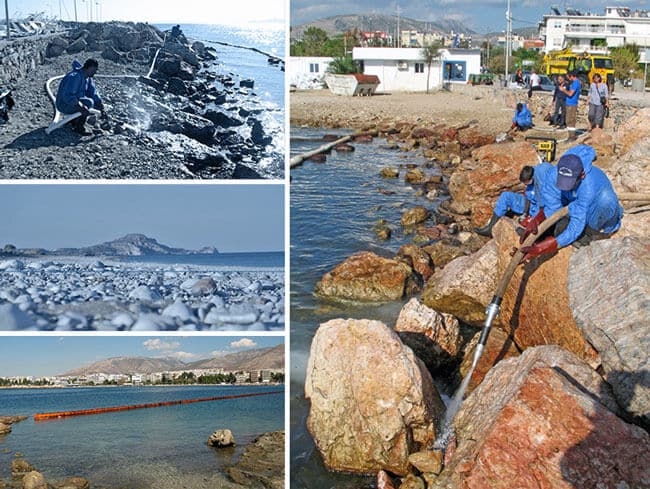Two experts are in Greece (8 to 14 October) to give technical support on sunken oil assessment, removal techniques and efficient oil removal from sandy beaches. This follows the sinking of the AGIA ZONI II, off Piraeus, on 10 September.

Image Credits: imo.org
The experts are from the Centre of Documentation, Research and Experimentation on Accidental Water Pollution (Cedre) based in Brest, France, and from the Italian National Institute for Environmental Protection and Research (ISPRA) based in Rome, Italy. Both centres are members of the Mediterranean Assistance Unit (MAU), which was established in 1993 and can be mobilized by REMPEC to assist in the event of an emergency situation.
The MAU was established by the Parties to the Barcelona Convention for the Protection of the Marine Environment and the Coastal Region of the Mediterranean. IMO administers REMPEC, based in Malta, under the Protocol to the Barcelona Convention Concerning Co-operation in Preventing Pollution from Ships and, in Cases of Emergency, Combating Pollution of the Mediterranean Sea, 2002.
AGIA ZONI II – Greece activates the Mediterranean Assistance Unit (MAU)
Date: 8/10/2017 – 14/10/2017
Pireaus (Greece)
The oil tanker “AGIA ZONI II” CS: SVAD4 – Greek flag – IMO No: 7126152 sank off Piraeus, Greece, on 10 September 2017, with 2.195 M/T fuel oil, 340 M/T marine gas oil as cargo, 15 M/T marine gas oil as bunkers and 300 L lubricants on board.
Further to the request for assistance published by the Hellenic Coast Guard on the Common Emergency Communication and Information System (CECIS) and the acceptance of REMPEC’s offer, two (2) experts have been mobilised for a mission in Athens, Greece, from 8 to 14 October 2017, in the framework of the Mediterranean Assistance Unit (MAU).
The experts from the Centre of Documentation, Research and Experimentation on Accidental Water Pollution (Cedre) based in Brest, France, and from the Italian National Institute for Environmental Protection and Research (ISPRA) based in Rome, Italy, both members of the MAU, will provide technical support on sunken oil assessment and removal techniques and efficient oil removal from sandy beaches.
The MAU has been established by the Eighth Ordinary Meeting of the Contracting Parties to the Barcelona Convention held in Antalya, Turkey in 1993, (UNEP(OCA)/MED IG.3/5, Appendix II).
The MAU is an expert advice capability which is to be mobilized by the Head of Office of REMPEC upon request of a Contracting Party in case of an emergency situation. An expert can be sent to provide national authorities with advice and technical expertise which they may need during the initial period of a marine pollution incident in order to decide which measures to take. This advice and technical expertise may include: assessment of the situation, adapting national response according to the circumstances of the accident, response methods and techniques, experts, equipment and products which can be requested from Contracting Parties or from private organisations.
To facilitate the mobilization of MAU experts and reduce burdens from Mediterranean coastal States, an MAU special revolving fund managed by REMPEC has been established by the Fifteenth Ordinary Meeting of the Contracting Parties to the Barcelona Convention held in Almeria, Spain, in 2008 to secure the funds required to mobilise an expert to cover up to a one month mission.
The MAU is currently composed of the following members:
– Cedre, expertise on oil and chemical spills;
– ISPRA, expertise on oil and chemical spills;
– Federazione Nazionale dell’ Industria Chimica (FEDERCHIMICA), expertise on chemical spills;
– Sea Alarm Foundation, expertise on oiled wildlife response;
– Mediterranean Operational Network for the Global Ocean Observing System (MONGOOS), expertise on oil spill forecasting model.



















